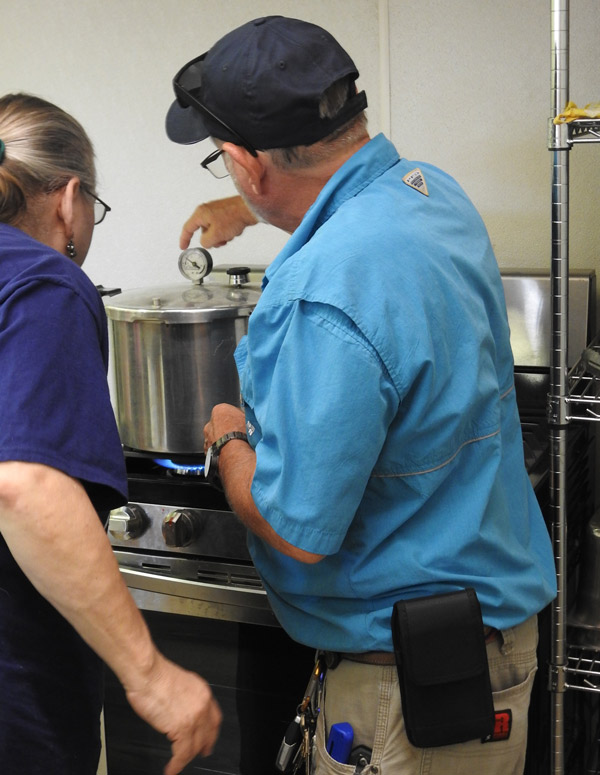
Canning food, building community
By Kristin Yarbrough. Published in the Blount Countian on July 13, 2022.
"Be very careful," Erma Griffith warned as she pressure-canned green beans in the family's Pine Mountain kitchen. "It could blow up on you!" Mama's words stuck with her young daughter.
Fifty-five years later, Sandra Liddicoat still feared the pressure cooker. She watched wistfully as Brenda Gantt, the cook and author from Andalusia, canned watermelon rind preserves and spoke of her aunt's bright purple jelly colored with Pinkeye hulls.
Sandra's own cooker gathered dust in a back bedroom—until she brought it to Learn About Canning, a skillshare gathering at Pine Mountain Community Center. In the former Blount Highland two-room schoolhouse where Sandra once studied, neighbors shared knowledge about the fading art that has seen a surge of interest amid empty grocery shelves and climbing prices.
"Growing up, there was always a kitchen full of canning with mom and grandma," said Becky Lowe of Remlap. "I should have paid more attention—that old school knowledge is hard to find. I feel like it's our duty to bring back some of the good old ways." Growing food for the first time since childhood, Becky intends to can a rainbow of fruit and vegetables from her own thriving garden as well as from neighbors. "I left feeling educated enough to can by myself," she said.
Pine Mountain resident and canning veteran Sue Waldrop explained how to prepare shelf-stable food that can be enjoyed without fear of botulism. The eldest daughter among six children, Sue grew up helping her mother Birdella "Skipper" Gilbert in the kitchen. Now 101 years old and also present at the gathering, Skipper put up spinach, beets, carrots, peas, green beans, and plum jam from the family's large garden.
Sue's husband Jon Waldrop demonstrated the canning of Zipper Cream cowpeas, noting when and how to safely open the pressure cooker. Sue and Jon described canning chicken from raw, and jarring spaghetti sauce, chili, and soups full of spices, aromatics, and meat. "If it's in a can" such as could be found on a grocery store shelf, "it can be done," Sue assured.
The versatility and creative potential of canning were among its many appeals. Sandra gasped with excitement as Sue explained that even green tomatoes can be processed, and that this light precooking results in perfectly textured fried green tomatoes, any time of year.
"I was encouraged in this meeting to try out things I hadn't even thought of, like canning meat," said Becky Hanks. "I think I could can several jars of chicken and avoid messing up the kitchen that many times," making it quick and easy for Hanks to prepare her chicken tetrazzini for dinner.
A "city girl" raised in the Huffman neighborhood of Birmingham, Becky's only prior exposure to canning was botulism warnings. "The family story is that my grandmother had eight surviving children and two that died: one stillborn, and the other when he was three after he ate green beans." Now residing and gardening in Remlap, Becky desired to preserve a potential bumper crop—safely.
Back at home, Becky dove in first with a pickle recipe and next with a case of tomatoes. "It's going to be an interesting journey," Becky said. "Something else to put a wrinkle in my brain." Sue delighted at these transformations: "The kicker was that people came scared and left confident and excited."
Sue also shared the history of canning, tracing back to the Ball Brothers, John Landis Mason, and the 12,000 franc prize awarded in 1810 by French army for an innovation to feed Napoleon's traveling forces, which Becky found especially interesting. "Of course it had to be around the time of Louis Pasteur," Becky said, "but where it got started with Napoleon? I didn't even think about that!" Frenchman Nicolas Appert's winning preservation method is still used today, and pressure cooker technology has become safer and easier to use.
Two hundred years later, canned food is still recognized as essential for disaster preparedness. Springville resident and Louisiana native Raetta Young, who weathered four months without electricity following 2005's Hurricane Rita, understands its importance firsthand. In Louisiana, Raetta said, even water is canned so that it is safe to drink indefinitely, compared to the USDA-recommended two year shelf life for bottled water, due to plastic degradation.
Sue, Jon, Raetta and other neighbors shared their experience with enthusiastic generosity. "The less you can do for yourself, the more dependent you are on someone else, the more control they have over you," Raetta said. "That's why you need to be sharing. Get the knowledge back out there. Teach what you know, to help make better citizens, to make a better community."
